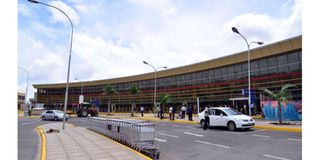Kenya risks UK blacklist over open Tanzania border

What you need to know:
- Britain’s Telegraph newspaper, quoting a source from the British High Commission in Nairobi, said that Kenya is likely to be added to the ‘red list’ by March 29.
- Kenya has been hesitant to restrict movement on the Tanzania border, fearing retaliation by Dar es Salam.
- Last August, Tanzania banned four Kenyan airlines from its market as a tit-for-tat trade war between the two countries escalated after Nairobi included Tanzanians among travellers to be put under mandatory quarantine.
Kenya risks joining the UK’s ‘red list’ of countries from where travellers are subjected to mandatory stay at quarantine hotels due to the government’s reluctance to close the border with Tanzania.
Britain’s Telegraph newspaper, quoting a source from the British High Commission in Nairobi, said that Kenya is likely to be added to the ‘red list’ by March 29.
Kenya has been hesitant to restrict movement on the Tanzania border, fearing retaliation by Dar es Salam.
Last August, Tanzania banned four Kenyan airlines from its market as a tit-for-tat trade war between the two countries escalated after Nairobi included Tanzanians among travellers to be put under mandatory quarantine.
Should the UK place Kenya on the “red list”, travellers from the country to Britain will have to pre-book and pay £1,750 to spend 10 days in government-sanctioned hotels. The cost covers the hotel stay, transport and testing.
The decision would deliver yet another devastating blow to tourism not only in Kenya but across the continent.
With South Africa, Ethiopia, Qatar and UAE already on the red list, Nairobi has been the last major hub for connecting flights into the UK.
“For weeks, red list rumours have been circulating Nairobi; a refusal to close borders with neighbouring Tanzania, which has not published coronavirus statistics since May 2020, was touted as a key factor,” said the Telegraph.
Wednesday, British High Commission in Nairobi told the Business Daily it would not comment on the reports of an alert on Kenya.
“The red list is kept under constant review and we will not hesitate to act when needed. We do not provide a running commentary on whether specific countries may be removed or added to the list,” said British High Commission’s spokesperson.
Tanzanian authorities have taken a controversially relaxed approach to tackling the coronavirus pandemic.
The refusal by former President John Magufuli, who died on March 17, to impose lockdowns or physical distancing measures and to halt the release of figures on infections since late April, made him a regional outlier and caused concern among Tanzania’s neighbours and the World Health Organisation.
Tanzania’s government has declared the country free from Covid-19 and has no plans for vaccination.
Top officials in Tanzania have also warned -- without providing any evidence -- that Covid-19 vaccines could be harmful and has instead been urging citizens to use steam inhalation and herbal medicines, neither of which have been approved by the WHO as treatments.
The UK is fretful that travellers from Kenya could bring Covid variants to Britain in the wake of free movement across the border with Tanzania.
Kenya, which had reported 124,707 cases of Covid-19 infections and 2,066 deaths by yesterday, is currently gripped by a third wave of infections, which is stretching its health facilities.
Kenya and Tanzania have in the last four years had bruising fights over work visa, taxes and market access rights for items such as sugar, milk and dairy products.
This has affected bilateral trade between the two nations, prompting a series of meetings, including a summit in Arusha from November 12-16 last year to try and thaw the frosty ties.
It was the second such summit following a similar one in May 2019 in which Kenya raised concerns over multiple non-tariff barriers placed on its goods entering Tanzania.
Although the East African Community (EAC) Customs Union Protocol requires that partner States treat goods manufactured from each other like local products, Tanzania and Kenya have repeatedly feuded over market access.
For instance, Tanzania has frequently claimed that Kenyan manufacturers have abused duty-free sugar imports to make sweets and other confectioneries which they later dump into its market.
Tanzania, therefore, opted to retain 25 percent import duty on Kenyan-made confectioneries such as chocolate, ice cream, biscuits and sweets, citing use of imported industrial sugar besides continuing to levy 25 percent duty on Kenya’s edible oils as well as the Tembo cement brand produced by Bamburi Cement factory that it says are made from imported palm and clinker respectively.
Nairobi retaliated by imposing new tariffs on Tanzanian products such as flour.





